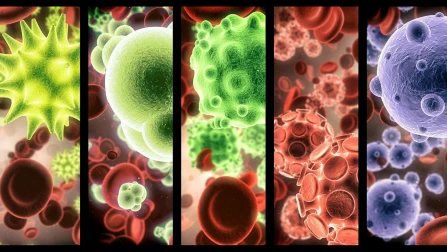
Journal updates
-
-
Dispersal in small organisms
CALL FOR PAPERS | Deadline: November 1, 2024
This special issue will revisit the theme on the 50th anniversary of Daniel Otis Wolfenbarger’s Factors Affecting Dispersal Distances of Small Organisms with contributions on behavior, ecology, genetics, and evolution that deal with factors promoting and restricting dispersal. -
Morphological responses to climate change
CALL FOR PAPERS | Deadline: November 30, 2024
UN SDG 13 (Climate Action); SDG 14 (Life Below Water); SDG 15 (Life on Land)
We invite contributions that identify morphological changes across different organismal groups, explore the mechanisms underlying the changes, and/or investigate their consequences for species’ physiology, survival, and reproduction; studies that examine the biotic and abiotic factors that promote or mitigate such morphological responses are also encouraged, as they play an important role in identifying the characteristics of organisms that make them more likely to evolve morphologically in response to climate change. -
Fitness Effects of Mutations
CALL FOR PAPERS | TOPICAL COLLECTION
We have brought together ideas from theoretical, molecular, field, computational and various experimental approaches across organisms and systems; and seek additional submissions that demonstrate mutational effects on phenotypes, particularly fitness phenotypes, that are further enhanced by genomic, theoretical computational advances, and that take these problems into ecological settings.
-
Mimicry beyond natural selection on colour
CALL FOR PAPERS | TOPICAL COLLECTION
This collection aims to collate articles that investigate current and novel aspects of mimicry evolution.
-
Reviews and Perspectives
CALL FOR PAPERS | ARTICLE TYPES
Evolutionary Ecology is excited to invite prospective authors, especially Students and Early Career Researchers (this opens in a new tab), to submit Review and Perspectives papers on any topic related to the interface of ecology and evolution (i.e., research that seeks to explain the ecology of organisms in the context of evolution, or patterns of evolution as explained by ecological processes).
-
Developments in the study of poison frog evolutionary ecology
FORTHCOMING SPECIAL ISSUE | Early 2024
We sought submissions that highlighted recent developments on poison frog (sensu lato) research and other topics including, but not limited to, sexual selection, predator-prey interactions, behaviour, adaptation, life history, disease ecology, genetic and phenotypic diversity, ecophysiology, response to anthropogenic factors, etc., and on taxa such as dendrobatids, Mantella, Brachycephalus, certain bufonids (i.e., Atelopus, Melanophryniscus, Rhinella), and Pseudophryne.
-
Mother strawberry poison frogs might supplement nutritive eggs with secretory provisioning
FEATURED PAPER | Freely accessible until May 31, 2024
This study suggests strawberry poison frog tadpoles obtain nutrients via skin-sucking behavior, potentially supplementing egg provisioning in phytotelm-breeding anurans. -
Four’s a crowd: social preferences for larger groups in golden mantella (Mantella aurantiaca) tadpoles
FEATURED PAPER | Open access
This study examined golden mantella tadpoles' social tendencies and group size preferences using a two-choice design with varying conspecific numbers. -
Infectious disease
LATEST SPECIAL ISSUE | Volume 37, issue 1, February 2023 (this opens in a new tab)
Issue editors: Jessica Hite, Stuart Auld
Studies in this theme issue break new ground by integrating empirical and field studies stemming from a diverse array of taxa and ecosystems to understand how ecological and evolutionary feedbacks shape host-parasite interactions. -
In Review: Preprint Service
AUTHOR SERVICE
Evolutionary Ecology, in partnership with Research Square, now offers In Review: a journal-integrated preprint service. -
Students & Early Career Researchers
AUTHOR INCENTIVE
As a student or ECR (defined as being within one year of award of their PhD degree) listed as first author of any article type accepted, you will receive a voucher for free access to any Springer publication in eBook form (up to a maximum value of 250 Euros/US dollars, and maximum one per year) in perpetuity, and your article will be made freely accessible for 8 weeks after online first publication. -
Virtual Archive of Past Featured Papers
FEATURED PAPERS ARCHIVE
We invite you to explore this virtual archive of past featured papers since 2018. -
Conservation Evidence
AUTHOR SERVICE
Abstracts guidelines for practitioners. -
Publication of color illustrations is free of charge...
AUTHOR INCENTIVE
...in both the online and printed versions!















